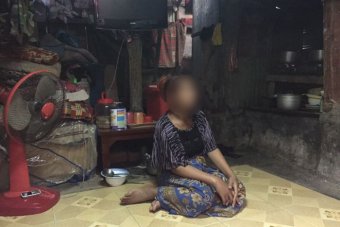Cambodia offers amnesty so Australians can collect surrogate babies
Updated
Cambodia has offered a limited amnesty to Australians who have paid for surrogacy services, saying they can collect their babies without fear of arrest.
Key points:
- Cambodian Government wants Australian intended parents to fulfil their financial commitments to surrogate women
- Amnesty will only apply to the 23 pregnancies arranged by Tammy Davis-Charles
- Amnesty welcomed by surrogacy advocates
The assurance comes a week after Australian nurse Tammy Davis-Charles was arrested in Phnom Penh for operating a surrogacy agency and allegedly falsifying documents.
The Cambodian Government wants Australian intended parents to fulfil their financial commitments to surrogate women, who stand to earn $13,500.
"I can guarantee they will be safe if they [take] the responsibility for those children," said Chou Bun Eng, permanent vice-chairwoman of the National Committee for Counter Trafficking.
The amnesty will only apply to the 23 pregnancies that were arranged by Ms Davis-Charles.
"This case can be solved specifically but we cannot just continue to do the same thing for the new incidents," said Mrs Chou, who is also a Secretary of State at the Ministry of Interior.
Officials from the Australian Embassy met with Cambodian Government representatives on Thursday (local time), but the Department of Foreign Affairs and Trade did not respond to the ABC's request for comment.
Mrs Chou called on the Australian Government to help "collect the money" promised by Ms Davis-Charles to poor Cambodian women.
Amnesty a 'huge relief' for Australian intended parents
 Photo:
Surrogate mother Chan Nareth is five months pregnant and was terrified she would not receive her money. (ABC News: Liam Cochrane)
Photo:
Surrogate mother Chan Nareth is five months pregnant and was terrified she would not receive her money. (ABC News: Liam Cochrane)
The amnesty was welcomed by surrogacy advocates.
"It's a huge relief for Australian intended parents that there's going to be an amnesty," said Sam Everingham, the director of Families Through Surrogacy.
"The issue is, there's a number other agencies operating in Cambodia and we just need to make sure that those amnesties are granted for all current pregnancies."
He said the agencies' responsibilities continue even after the babies are born.
"There's been no assurances that the agencies will be able to keep operating so they can keep caring for the surrogates," Mr Everingham said.
Cambodia emerged as the new marketplace for relatively low-cost surrogacy after Thailand shut down its industry last year.
Nepal and India have also outlawed commercial surrogacy.
Mrs Chou told the ABC the recent crackdown was driven by a concern that commercial surrogacy could be used for organ harvesting or child sex abuse, and that babies might be neglected by foreign parents.
She said 52 women were recruited by Ms Davis-Charles to be surrogates, resulting in 23 pregnancies for Australian clients.
Mrs Chou said Ms Davis-Charles will remain behind bars while investigations continue.
Under Cambodian law, suspects may be held in pre-trial detention for up to six months.
Topics: pregnancy-and-childbirth, reproduction-and-contraception, health, government-and-politics, law-crime-and-justice, world-politics, cambodia, australia
First posted











